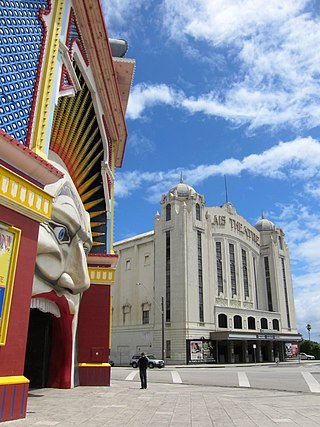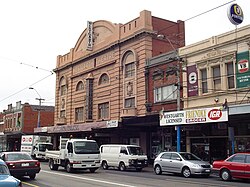
St Kilda is an inner seaside suburb in Melbourne, Victoria, Australia, 6 km south-east of the Melbourne central business district, located within the City of Port Phillip local government area. St Kilda recorded a population of 19,490 at the 2021 census.

Lygon Street is located in Melbourne, Victoria, Australia, running through the inner northern suburbs of Carlton, Carlton North, Princes Hill and Brunswick East. Lygon Street is synonymous with the Italian community of Melbourne, forming the nexus point of Little Italy. It is home to many Italian restaurants and alfresco cafés.

Northcote is an inner-city suburb in Melbourne, Victoria, Australia, 7 km (4.3 mi) north-east of Melbourne's Central Business District, located within the City of Darebin local government area. Northcote recorded a population of 25,276 at the 2021 census.

Westgarth railway station is a commuter railway station located on the Hurstbridge line, serving the north-eastern Melbourne suburb of Northcote, Victoria, Australia. Westgarth is an unstaffed status, ground structure station featuring two side platforms. The station opened on 8 May 1888 as Westgarth Street. It was renamed Northcote South on 1 August 1888, and Westgarth on 10 December 1906.

Westgarth is a neighbourhood within the suburb of Northcote, about 4 or 5 km north-east of Melbourne's central business district in Victoria, Australia. It is in the local government area of the City of Darebin. The neighbourhood has a commercial centre, distinct from the main commercial centre of Northcote, located near Westgarth railway station, just north of Clifton Hill. While Westgarth does not have any official borders, it is generally considered to extend from Merri Creek in the west to the boundary of Fairfield in the east.

Glebe Point Road is the main road of the inner city suburb of Glebe in Sydney, New South Wales, Australia. It is a boutique shopping strip with numerous restaurants and cafés.

Chapel Street is a street in Melbourne, Victoria, running along the inner suburbs of South Yarra, Prahran, Windsor, St Kilda and St Kilda East.

The Melbourne cable tramway system was a cable car public transport system, which operated between 1885 and 1940 in Melbourne, Victoria, Australia.
Nirvana Street Murder is a 1990 Australian comedy film, written and directed by Aleksi Vellis, starring Mark Little, Ben Mendelsohn, Sheila Florance, Mary Coustas and Russell Gilbert.

The Palais Theatre, formerly known as Palais Pictures, is a historic picture palace located in St Kilda, an inner suburb of Melbourne, Victoria, Australia. With a capacity of nearly 3,000 people, it is the largest seated theatre in Australia.

The Astor Theatre is a classic, single-screen jazz moderne revival movie theatre in the Melbourne suburb of St Kilda, first opened in 1936 and still in operation today.

The Palace Theatre was an entertainment venue located in Melbourne, Australia. First built for live theatre in 1912, it was also used as a cinema and for live music. It was demolished except for its facade in 2020 after much community opposition, to be replaced by a hotel.
Palace Cinemas is an Australian cinema chain that specialises in arthouse and international films.
A Music Victoria study finds Melbourne hosts 62,000 live concerts annually, making it one of the live music capitals of the world. Victoria is host to more than three times the live performance national average, making it the live music capital of the country. Melbourne is host to more music venues per capita than Austin, Texas.
Future Schlock is a 1984 Australian film. It was the first of four movies made by the team of Barry Peak and Chris Kiely who ran the Valhalla Cinemas in Sydney and Melbourne. The movie was known in production as The Ultimate Show. The producers claimed they managed to recoup half the amount of money they spent on the film.
Channel Chaos is a 1985 Australian film set at a TV station.
Marvellous Melbourne: Queen City of the South is a 1910 documentary of Melbourne that takes the audience through the hotspots of its central business district and surrounding features. Published in 1910, the film stands as the oldest surviving documentary of the city. It is currently housed at the National Film & Sound Archive in Pyrmont, Sydney. At the time of filming, Melbourne was the federal capital of Australia, until the development of Canberra in 1927.
New Farm Cinemas is a cinema at 701 Brunswick Street, New Farm, City of Brisbane, Queensland, Australia. It was first built c. 1921. It is also known as Astor Theatre, Merthyr Picture Palace, and Village Twin Cinema Complex. While not heritage-listed itself, the New Farm Cinemas redevelopment has retained elements of the heritage-listed Village Twin Cinema, which was added to the Queensland Heritage Register on 24 March 2000.

The Westgarth Theatre, formerly the Valhalla Cinema and now operating as the Palace Westgarth, is a heritage-listed movie theatre in the Westgarth neighbourhood of Northcote in Melbourne, Australia. It is the oldest continually-operating, purpose-built cinema in the city.












